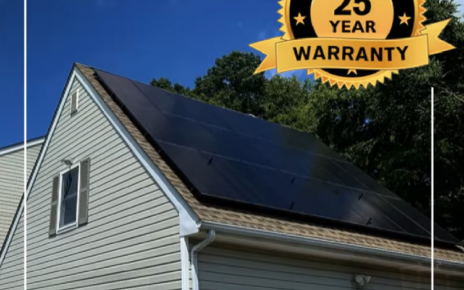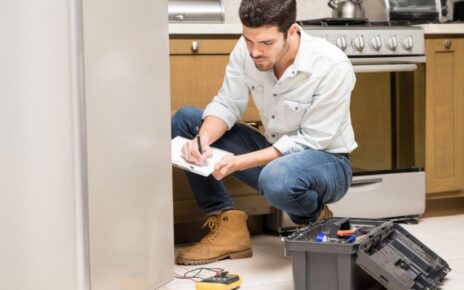Gutters play a vital role in maintaining the integrity of your home. They divert rainwater away from your roof, walls, and foundation, protecting your property from water damage. However, gutters can deteriorate over time and require replacement. In this blog post, we will discuss the top 10 signs that indicate your gutters need replacing as soon as possible. By identifying these signs early on, you can prevent further damage and ensure the optimal functioning of your gutter system.
Rust and Corrosion
One of the most obvious signs that your gutters need replacing is the presence of rust or corrosion. Over time, exposure to moisture and the elements can cause gutters to rust, compromising their structural integrity. Rusty gutters are prone to leaks and may not effectively channel water away from your home. If you notice patches of rust or areas of corroded metal, it’s a clear indication that it’s time for a replacement.
Here’s a closer look at why rust and corrosion are important signs that it’s time to replace your gutters:
Structural Integrity Compromised: Rust weakens the metal components of the gutter system, compromising its structural integrity. As rust spreads, it can create holes and weak spots in the gutters, making them less effective at channeling water away from your home.
Leakage and Water Damage: Rusty gutters are more prone to developing leaks. Water can seep through the holes and cracks in the gutters, leading to water damage to your home’s exterior, foundation, and landscaping. This can result in costly repairs and pose a risk to the structural stability of your property.
Aesthetics: Corroded and rusty gutters are unsightly and can negatively impact your home’s curb appeal. If you care about the appearance of your home, replacing rusty gutters with new ones will improve its overall look.
Health Concerns: Standing water in rusty gutters can become a breeding ground for mosquitoes and other pests, potentially increasing health risks for you and your family.
Preventive Measure: Addressing rust and corrosion promptly by replacing the gutters can prevent more extensive damage to your home’s roof, siding, and foundation. This proactive approach can save you from costly repairs in the long run.
Sagging or Pulling Away from the House
When gutters start to sag or pull away from the house, it’s a sign that they are no longer securely attached, which can occur due to aging, improper installation, or excessive debris buildup. Sagging gutters fail to direct water properly, leading to pooling and potential damage to your home’s foundation. If you observe your gutters drooping or pulling away from the fascia, it’s essential to address the issue promptly by replacing them.
Cracks and Holes
Cracks and holes in your gutters are detrimental to their functionality. They can develop due to age, impact from falling branches, or improper maintenance. Even small cracks or holes can cause water damage to your home’s exterior or interior. Regularly inspect your gutters for any visible cracks or holes. If you notice such issues, replace the damaged sections or the entire gutter system to prevent further deterioration.
Peeling Paint or Stains on Siding
Leaking Gutter
If you observe peeling paint or stains on your home’s siding, it could be a result of faulty gutters. When gutters are damaged or clogged, water can overflow and seep into the siding, causing discoloration, mold growth, or rot. These signs indicate that your gutters are not effectively directing water away from your home. By replacing the gutters promptly, you can prevent further damage to your siding and maintain the aesthetic appeal of your property.
Water Damage in the Basement or Crawlspace
Water infiltration in the basement or crawlspace is an issue. Faulty gutters can contribute to this problem by allowing water to overflow and pool around your home’s foundation. Over time, this can lead to cracks, mold growth, and structural damage. If there are signs of dampness, water stains, or a musty odor in these areas, replace gutters to ensure proper water diversion and protect the structural integrity of your home.
Eroded Landscaping or Washed-out Soil
When gutters fail to channel water away from your property, excessive water runoff can erode your landscaping and wash away the soil. If you notice pools of water, exposed roots, or soil erosion near the foundation, gutters are not functioning optimally. By replacing the gutters, you can prevent further damage to your landscaping and maintain the stability of your yard.
Pest Infestations
Damaged or clogged gutters can become an ideal breeding ground for pests such as mosquitoes, ants, and termites. Stagnant water and debris accumulation provide a habitat that attracts these unwanted guests. If you notice an increase in pest activity around your gutters or discover signs of pest infestation, your gutters are compromised. Replacing the gutters will eliminate these conducive conditions, helping you keep pests at bay and maintain a hygienic living environment.
Constant Gutter Maintenance
If you find yourself frequently cleaning and repairing your gutters, it may be time for a replacement. Gutters that require constant maintenance, such as frequent cleaning or resealing, are likely nearing the end of their lifespan. Upgrading to new gutters will not only save you time and effort but also provide you with a more efficient and reliable gutter system that requires minimal maintenance.
Mold or Mildew Growth
Mold and mildew thrive in moist environments, and malfunctioning gutters can create the perfect conditions for their growth. If you notice black or green patches on or near your gutters, it’s a sign of a mold or mildew infestation. These fungal growths can spread to your home’s exterior, compromising its structural integrity and posing health risks to occupants. Replacing the gutters will help eliminate the source of moisture and prevent further mold or mildew growth.
Age of the Gutters
Lastly, consider the age of your gutters. Even if there are no visible signs of damage, gutters that are more than 20 years old may not be as effective as modern gutter systems. Aging gutters are more susceptible to leaks, rust, and other issues, reducing their overall performance. If your gutters are nearing or have exceeded their expected lifespan, it’s wise to replace them proactively to ensure your home remains well-protected from water damage.
Regularly inspecting your gutters for signs of damage is crucial to maintaining the structural integrity of your home. If you notice any of the ten signs discussed in this blog post, it’s essential to take immediate action and replace your gutters. By investing in a new gutter system, you can protect your home from water damage, prevent costly repairs, and ensure the optimal functioning of your drainage system. Remember, timely replacement of gutters will not only enhance the curb appeal of your home but also provide you with peace of mind during heavy rainstorms.
About the Author: Lauren Marsh from Huntsville, AL, contributed her insights for this article. She’s been working as a general contractor at Ridgeline Construction Roofing & Exteriors for 11 years and is a leading voice for women in the construction industry.




